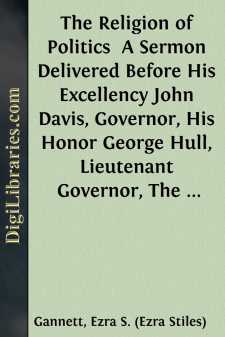Categories
- Antiques & Collectibles 13
- Architecture 36
- Art 48
- Bibles 22
- Biography & Autobiography 813
- Body, Mind & Spirit 142
- Business & Economics 28
- Children's Books 17
- Children's Fiction 14
- Computers 4
- Cooking 94
- Crafts & Hobbies 4
- Drama 346
- Education 46
- Family & Relationships 57
- Fiction 11829
- Games 19
- Gardening 17
- Health & Fitness 34
- History 1377
- House & Home 1
- Humor 147
- Juvenile Fiction 1873
- Juvenile Nonfiction 202
- Language Arts & Disciplines 88
- Law 16
- Literary Collections 686
- Literary Criticism 179
- Mathematics 13
- Medical 41
- Music 40
- Nature 179
- Non-Classifiable 1768
- Performing Arts 7
- Periodicals 1453
- Philosophy 64
- Photography 2
- Poetry 896
- Political Science 203
- Psychology 42
- Reference 154
- Religion 513
- Science 126
- Self-Help 84
- Social Science 81
- Sports & Recreation 34
- Study Aids 3
- Technology & Engineering 59
- Transportation 23
- Travel 463
- True Crime 29
The Religion of Politics A Sermon Delivered Before His Excellency John Davis, Governor, His Honor George Hull, Lieutenant Governor, The Honorable Council, And The Legislature Of Massachusetts, At The Annual Election, January 5, 1842.
Description:
Excerpt
SERMON.
1 Corinthians, x. 31.
WHETHER YE EAT OR DRINK, OR WHATSOEVER YE DO, DO ALL TO THE GLORY OF GOD.
The solemnities of this occasion belong to a Christian people. By them religion is solicited to throw her protection and authority around the institutions of the State. The citizen and the magistrate recognise their common relation to a higher Power than the functionary or the State, and in such recognition exchange the pledge of a mutual fidelity. The custom which this day renews comes to us from the founders of the Commonwealth—men of strong faith and religious hearts, who erected their political fabric as a temple in which to worship God, and inscribed over its front the name of the one Master whom they honored, even Christ. The place to which our legislators and rulers have come upon entering on their official duties is the house of prayer and Christian instruction. Every thing that distinguishes the occasion seems to point out the course of remark in which he who addresses this audience should invite his hearers to follow him. The relation of religion to politics—the religion of political life—is the subject to which he is unequivocally directed; and of which it is my purpose to treat, at such length only as the limits of the occasion will allow, but with such plainness of speech as should alone be used before freemen by one as free as they when speaking on their common duties.
There is however what may be called a political side to this subject, on which it would be improper for me to introduce any remarks at this time. The bare mention of religion and politics in connexion alarms some minds, who fear lest the liberties of the people be invaded by zealous religionists, or the public affairs of the time be handled by honest or ambitious preachers—in either case wandering beyond their appropriate limits. Let me at the outset disclaim all intention of touching questions to which a temporary interest only can belong, or of assailing the order of our civil state. It is higher ground which I hope to occupy as I examine the religious aspects of citizenship. When I speak of the religion of political life, I mean that religion should control men in the exercise of their political rights as it should control them in all their other relations and concerns. The religion of politics is nothing else than the application of religious principles to political action, whether it be the action of a statesman or a private citizen, of an individual or of the community. The politician should respect these principles as much as any other man. Political opinion, political discussion, political life should be brought under the influence of religious convictions. This is the ground which I take, and which I shall endeavor to prove is the only ground on which a Christian can consistently stand.
Religion should govern all political sentiment and action. Why not? Why should such a claim on behalf of religion be accounted extravagant, or meet with any other than a unanimous assent?...


